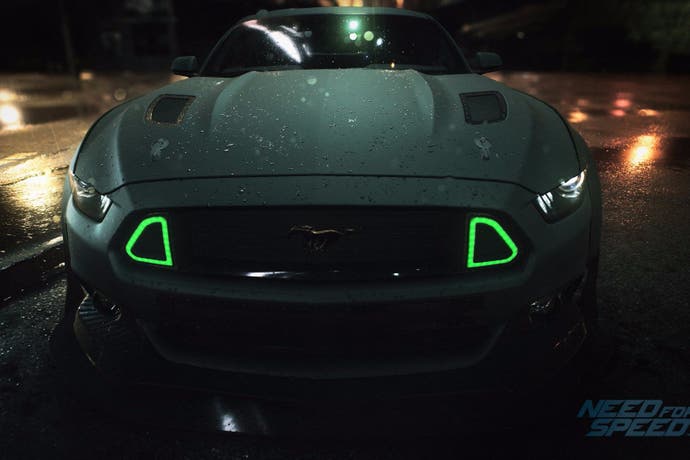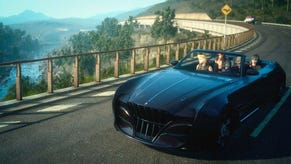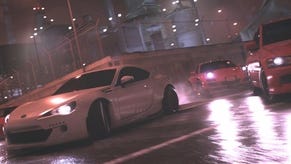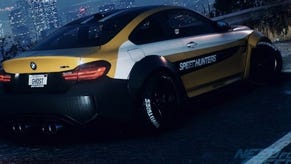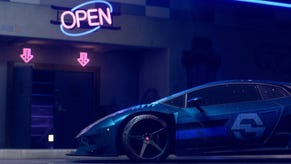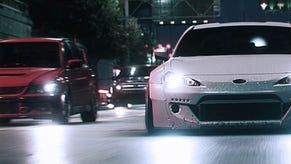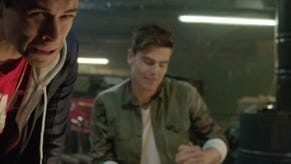The next Need for Speed is a reboot
We speak with Ghost Games about its new racer.
The next Need for Speed game is a reboot due out on PC, PlayStation 4 and Xbox One autumn 2015.
EA has decided to eschew the Underground and Most Wanted sub-brands in favour of a game Swedish developer Ghost Games says gets to the roots of the long-running racing series.
The focus with this Need for Speed, which has benefited from the developer taking a year off from having to release a new game in 2014, is car customisation, authentic urban car culture and telling a story.
There's also mention of "a nocturnal open world", which executive producer Marcus Nilsson told Eurogamer in an interview, below, means Need for Speed is set from dusk to dawn.
Meanwhile, with this year's Need for Speed the series leaves behind the last generation of consoles: the PlayStation 3 and Xbox 360. This, Nilsson said, gives the developers more "focus".
Need for Speed's teaser trailer is below. More will be revealed at E3 during EA's press conference on 15th June.
Why did you decide to do a reboot rather than another Underground or Most Wanted?
Marcus Nilsson: If you think about Need for Speed in the last couple of years it's been bouncing back and forth between studios and different creative teams. And it's seldom built upon what has been before.
So, you could say Need for Speed has lost its way... what the brand stood for. As we talked to our fans and the players, it emerged they wanted also what we wanted to build: to go back to what we call the roots of Need for Speed. They are the roots of what we think the experience needs to be. It's the Need for Speed experience that resonates the most with most people.
What does that mean for the game, exactly?
Marcus Nilsson: Having a gripping narrative, a storyline that pulls you through the game, where you really care about your car because we give you so many elements of tweaking it, building it and making it your own. And where we set you in an open world with lots of variety. It's trying to build a game that's defining the core pillars of what we think Need for Speed is.
Why did that require a full reboot rather than a sequel to Underground, Rivals or Most Wanted? What is it about this game that's different compared to what we've seen in previous games in the series?
Marcus Nilsson: It's the way we are telling that narrative, and it's about the combination of these things. Bringing back the right features together is the experience Need for Speed fans have been looking for. Going back to having a really robust and emotionally engaging story that pulls you through the game, at the same time as we give you enough variety to experience that story in slightly different ways, are the kind of features that stand out.
For many years we have not delivered on the love of cars, I think, or really gone deep into what are the right vehicles people want to have. If you look at Rivals, we had high-end cars - absolutely fantastic and cool high-end cars - but with that you leave some of the grassroot authentic car culture cars out. And this is an area we're looking into much more.
So the reason we go back and we call this a reboot is, imagine we went back into a room with a whiteboard and we said, 'okay, with all the Need for Speed games being a little bit all over the place during the last few years, what is the game we need to make going forward? And what do we want Need for Speed to stand for going forward?' This means we will get a creative direction starting with this game that we will probably follow for the next couple of years.
You mentioned you plan to do something different with the narrative with this game. Can you say exactly how you're doing that?
Marcus Nilsson: I can go as far as to say we are working close to car culture. There's a website called Speed Hunters, which is affiliated with Need for Speed, and through them we get a unique insight into this world. The narrative is connected to the deeper levels of car culture. We're trying to deliver on the authentic part of both cars and the love of cars, but also the customisation parts of that world.
You say you're going after more authentic car culture. How will that manifest itself in the game, in terms of the cars and features?
Marcus Nilsson: We want people to care about the cars, and that's where customisation is coming from. How do you get people to care about something in a car in a video game? You give them tools to perfect it and build it to what you want it to be. We want you to care about what you're driving around in.
The press release mentions a "nocturnal open world". What is it about the open world that makes it nocturnal?
Marcus Nilsson: I actually had to define it on my iPhone to know what that word meant! The world itself is set at dusk to dawn. You saw an open world in Rivals and how we with AllDrive filled it with a lot of different things to do. We've learned a lot from that experience. We're absolutely bringing AllDrive back into this, but in an improved way, making it easier to play with your friends. We want you to go into that world and get a large selection of variety. AllDrive is obviously part of that.
The structure of the open world Rivals was ambitious, but it took too long to find a race, and having to bank your score didn't work, for me. Have you addressed this with the structure of the new game?
Marcus Nilsson: Yes, it was hard. If I was playing the game and you came in and we wanted to play together, it wasn't the easiest thing to set up a race between us. Now, you can find me much easier and travel to me and set something up.
We've been trying to list what we think are the valid bits of feedback, but also talking directly to the fans who played our game, inviting them to the studio to play early prototypes and get their input into what we do. It's the most ambitious fan program we've done so far. We have been addressing a lot of those AllDrive challenges we had.
The scoring part is interesting. The risk and reward element we built in Rivals is something I think is interesting to explore in the future, but maybe not in that exact form.
In Rivals you were a racer or a cop. Are you doing something similar with this?
Marcus Nilsson: Cops are a core tenet of Need for Speed, but you don't necessarily have to play them. They need to be there as this adversarial set-up to bring tension towards the gamer. This game is built upon more authentic urban car culture, and as such you care about your car. There will definitely be cops in this world but they're not going to be other players.
That sounds like a conscious design decision you have made. Was that based on feedback to Rivals or was it simply something you wanted to do anyway?
Marcus Nilsson: The set-up in Rivals was great. The numbers were pretty much 50/50 in terms of which side people played. So I think that really worked. However, as we go back to the roots and we get a starting point, and we are covering this urban car culture world in this open world, we think we can build a compelling reason for you to care about your car. We want to put everyone in that car role but give you lots of variety within that instead.
Are you adding any new ways for you to compete against friends?
Marcus Nilsson: Variety is key, including for you playing your friends. If you look at the real world car culture, there are a lot of things we can learn from a game perspective to build gameplay you can enjoy if you base it on authenticity. There's a lot of variation in that.
Can you say how this will manifest itself in the game in terms of the kind of things you'll be getting up to?
Marcus Nilsson: Need for Speed is about speed. Races are absolutely there. People still want to be first across the finish line. But there are also a lot of different ways people go into this car culture. We go to drift events. We look at a lot of the stuff happening with Gymkhana. You might not drift on a track. You might drift on the streets. What type of events do they have? We're trying to dial into how people enjoy their cars in real life, and try to make something interesting from a gameplay perspective with that.
In terms of the handling model, Need for Speed has always been pretty arcadey. Will you continue with that for this game?
Marcus Nilsson: To me, Need for Speed is about edge of your seat driving - crazy driving, action driving, jumps, drifts, 140mph through a corner. But having said that, there's a lot of variety within that experience, and handling wise we are with this game delivering a very broad set of ways you can set up your car. The customisation of your car is important - what it looks like and how you want it to handle. We give you pretty much unprecedented choices when it comes to how you want to set it up.
The game is due out on PC, PS4 and Xbox One, so no last-gen versions. As a developer what benefit has that given you? How will the game be better as a result of not having to work across multiple generations of console?
Marcus Nilsson: It gives us focus. If you can deliver on consoles that are pretty much the same, you can level up in engine capabilities. Physical-based rendering cannot be done on last generation consoles. We can do that on next generation consoles. So it gives us focus so we can put more energy into features that can talk to each platform. But also we can employ techniques than can not run on older generation hardware. So a technical edge and a focus edge, which is as important.
A UK branch of Ghost Games helped with Rivals. Are you getting help from any other branches of EA with this game or is it an entirely Ghost Games-made product?
Marcus Nilsson: It is a Ghost Games game, but we have studios in Gothenburg, we have offices in Romania and we have offices in Guildford still. We're all working on this game collectively. And then also within EA we have pockets of different people helping us out. But it is absolutely a Ghost game, between those three sites.
You've had a year off to give you more time to make a better game. Is the idea now Need for Speed will return to an annualised franchise? Or will you stick with a two-year development cycle?
Marcus Nilsson: That's something we talk a lot about. I don't think I can go into it at this point. When we talk about a reboot, we're talking about creating what it is, but we're also talking from an EA perspective and how we look at the franchise. We are seeing some growth again within the genre. There are definitely more people interested in it. Project Cars coming out with a high quality game, was top of the charts in the UK. There's energy again, which I feel we're ready to go after as a franchise.
The year off was definitely very important for us as a brand, to sit down and understand what are the values and what are the games we want to make. But also making sure we make the game our fans really want. When you make a game every year, that can be tough. It's not impossible. But I think you need a really solid base of knowing what you are, and I think we've given ourselves that base now.
So the idea is to restart and refresh Need for Speed this year and go from there?
Marcus Nilsson: Yeah. I can't really go into it, but I'll go as far as to say we are looking into different ways we can run this franchise going forward.
